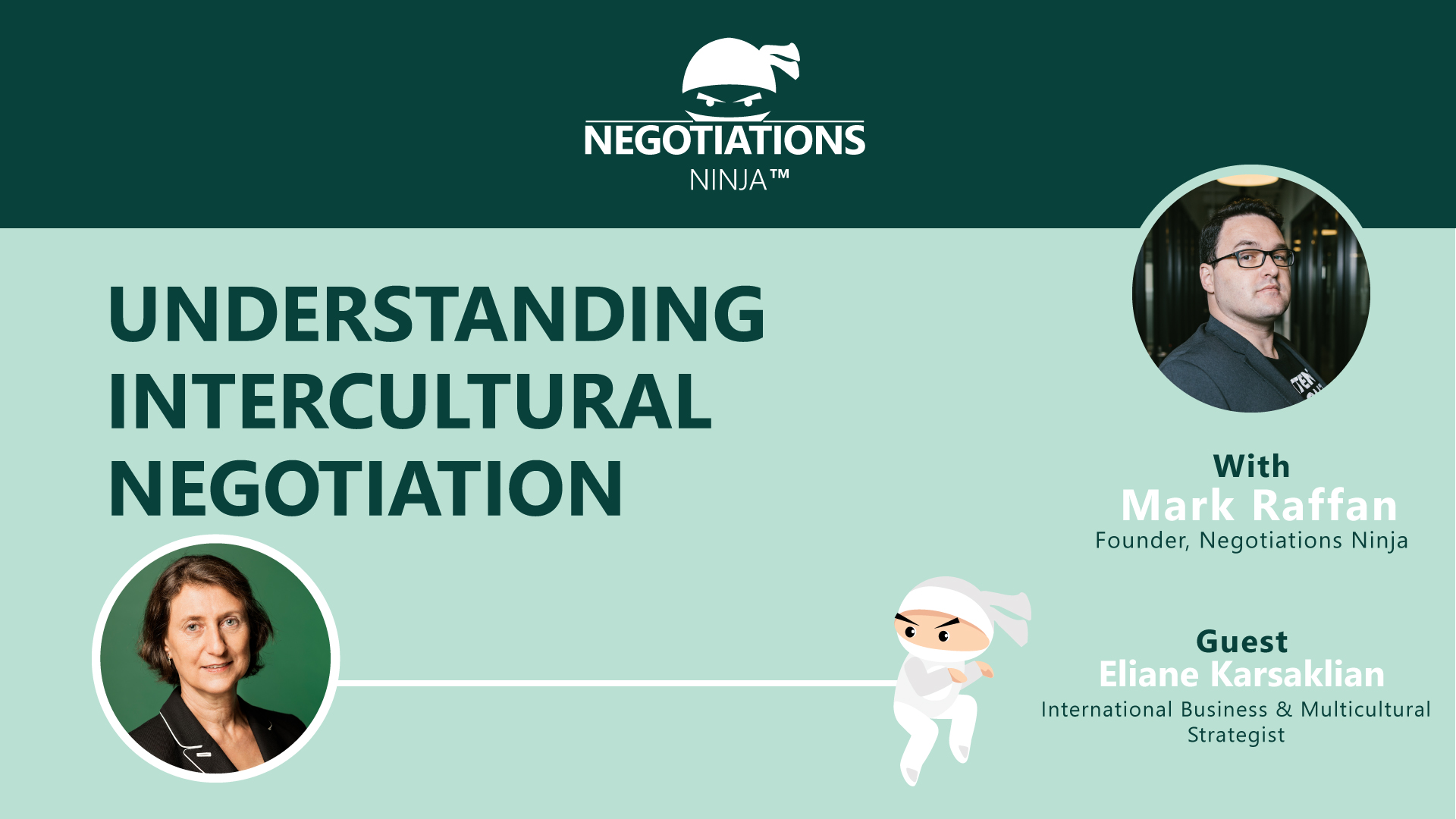As a child, Eliane Karsaklian learned to live in different cultures. Her parents didn’t explain cultural differences or what to expect each time they moved—she was simply thrown into it. After building 20 years of experience in the corporate world, she moved into academics and is currently a professor at the University of Illinois in Chicago.
Eliane wrote an amazing book called “The Negotiation Process Before, During, and After You Close the Deal” based on her life experiences living in and negotiating with different cultures. In this episode of Negotiations Ninja, we talk about what it takes to succeed with intercultural negotiation.
Outline of This Episode
- [2:39] Learn more about Eliane Karsaklian
- [3:52] What is a sustainable negotiation?
- [5:09] How to think strategically about the future
- [6:39] Create short-term milestones that feed the vision
- [9:41] What happens after you close the deal?
- [11:54] How to develop a long-term relationship
- [13:34] How foundational beliefs of a culture tie in
- [21:51] Operate through the lens of the other culture
- [29:44] Hire someone to coach you on intercultural business
How foundational beliefs of a culture tie into intercultural negotiation
Eliane Karsaklian believes that when you enter an intercultural negotiation, you need to have a good understanding of the culture and what their business practices are—and why they are the way they are. Western cultures often neglect the social side of negotiation, which is foundational in most other cultures.
You need to spend time building relationships. People negotiate with people. People belong to cultures. Everything we do has to do with the culture we were raised in. That can’t be separated from our negotiations.
In some cultures, you’ll spend more time negotiating because of the social side of the negotiation. What seems to be a waste of time in some cultures is absolutely necessary for others.
The foundation trust is built on varies
In the US, trust is based on your contract. What’s written will be enforced. But most other countries in the world build their trust in people and their social interactions with them. To them, a contract only means that you’ve agreed to work together, and it can be changed. Some cultures are more contextual. Those that aren’t contextual—like the US—enforce contracts as they are. Contextual cultures believe when the context changes, the contract can change.
Enter intercultural negotiations without making assumptions
People in the West presume that other cultures negotiate the same way they do. But many cultures have different foundational beliefs. Because people buy the same brands and products everywhere in the world, so they have the illusion that everyone behaves the same way everywhere. But it’s not true.
Tony Fang emphasizes that China’s negotiating style is based on an entirely different philosophy than Western cultures, i.e. Confucianism and Buddhism versus Judeo-Christian principles. Westerners don’t understand that the Chinese have a philosophy of life, rather than religion. Every action they take is based on that philosophy. Trust and ethics are based on the philosophy that you were socialized with. The culture rests on these pillars.
Westerners can get wrapped up in the way they believe things should be that they lose sight of the way things actually are. Things are different around the world. You have to realize that when you’re approaching international negotiations.
A business lunch in France usually lasts 2 hours. A three-day business trip to India won’t be successful. One poorly written email or unplanned visit can easily damage a relationship beyond repair. It’s quite easy to destroy a relationship before it’s even started.
That’s why, if you’re unfamiliar with a culture, you should hire an expert. If you don’t, you may greet someone improperly and ruin the whole deal from the start. Make the budget and make the time to do things right, so you’re not risking million-dollar deals.
Sometimes it’s quick training. Sometimes it’s someone negotiating on your behalf. Eliane volunteers to travel with some of her clients and negotiate on their behalf. Whatever you do, remember that intercultural negotiation must start with intense research and familiarizing yourself with the other culture.
Listen to the whole episode to learn more about building long-term sustainable relationships with business partners.
Resources & People Mentioned
Connect with Eliane Karsaklian
- Connect with Eliane on LinkedIn
- The Negotiation Process Before, During, and After You Close the Deal
Connect With Mark
- Follow Negotiations Ninja on Twitter: @NegotiationPod
- Connect with Mark on LinkedIn
- Follow Negotiations Ninja on LinkedIn
- Connect on Instagram: @NegotiationPod




